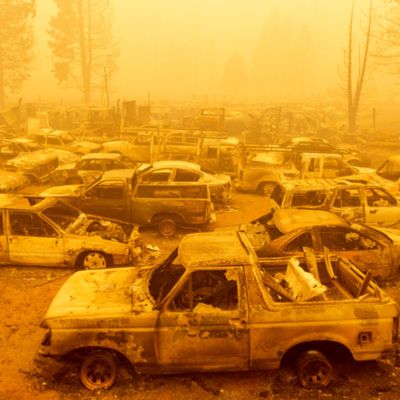
The world is warming at such a rapid rate that even if humanity launches a massive, coordinated effort to dramatically stem carbon emissions — which it has been unable to do up to this point — the Earth will experience considerably wilder and more unpredictable climate effects over the coming decades than have already become the norm.
That is the grim prognosis laid out by the latest downer of a report from the United Nations’ Intergovernmental Panel on Climate Change, whose bulletins in recent years have served as increasingly dire warnings about where planet Earth is headed. U.N. Secretary-General Antonio Guterres called the report “a code red for humanity.”
It’s not all bad news, though. The body finds that given the seriousness with which climate change has finally been treated in recent years, humans could be on track to stave off its worst effects, which would take place at 2 degrees warming and higher. And if humanity phases out net carbon emissions to zero by around 2050 — a possibility that would require a massive transformation of human society — it’s possible that serious climate-change effects like heat waves and sea-level rise, while still catastrophic, could stabilize as emissions fall.
The report, written by 234 authors who consulted more than 14,000 studies, finds it is “unequivocal” that humans are causing the climate change that has intensified change — about 1.1 degrees since the dawn of the industrial age. As with previous reports, it is full of eye-popping facts and figures that drive home just how dire the crisis facing humanity is: The Washington Post lays out some of them:
Humans have warmed the climate at a rate unparalleled since before the fall of the Roman Empire. To find a time when the level of carbon dioxide in the atmosphere changed this much this fast, you’d need to rewind 66 million years to the meteor that killed the dinosaurs.
Carbon dioxide in the atmosphere has risen to levels not seen in 2 million years, the authors state.
The report finds that the world will likely — though not definitely — smash through the 1.5 Celsius warming barrier in the 2030s, which will mean the heat waves, floods, fires, and hurricanes that have become more and more routine in recent years (and this summer in particular) are all but certain to become more frequent and severe. And many effects of carbon emissions, like shrinking ice sheets, will take thousands of years to reverse no matter what.
Still, a lot rides on what the global community decides to do in the next few years. The report lays out five paths for humanity, ranging from a business-as-usual approach to drastic emissions cuts in the near future. Under the previous edition of this report, in 2013, the world was on the hottest path; now it is on a slightly more moderate one. Ahead of a landmark climate change summit in Glasgow this fall, it would behoove world leaders to do considerably better than that.






























